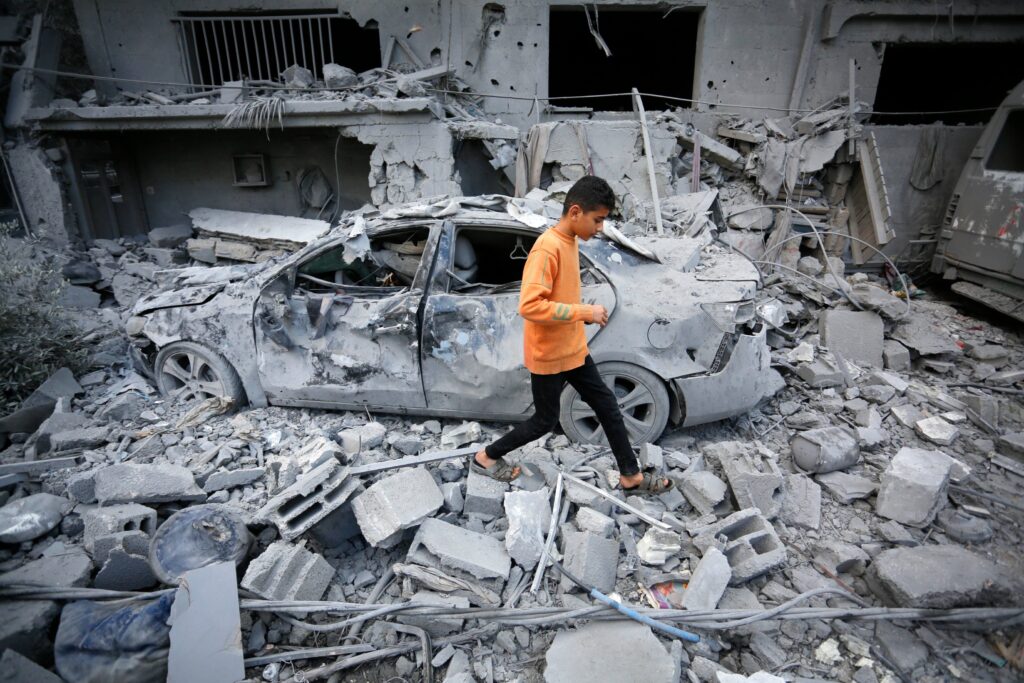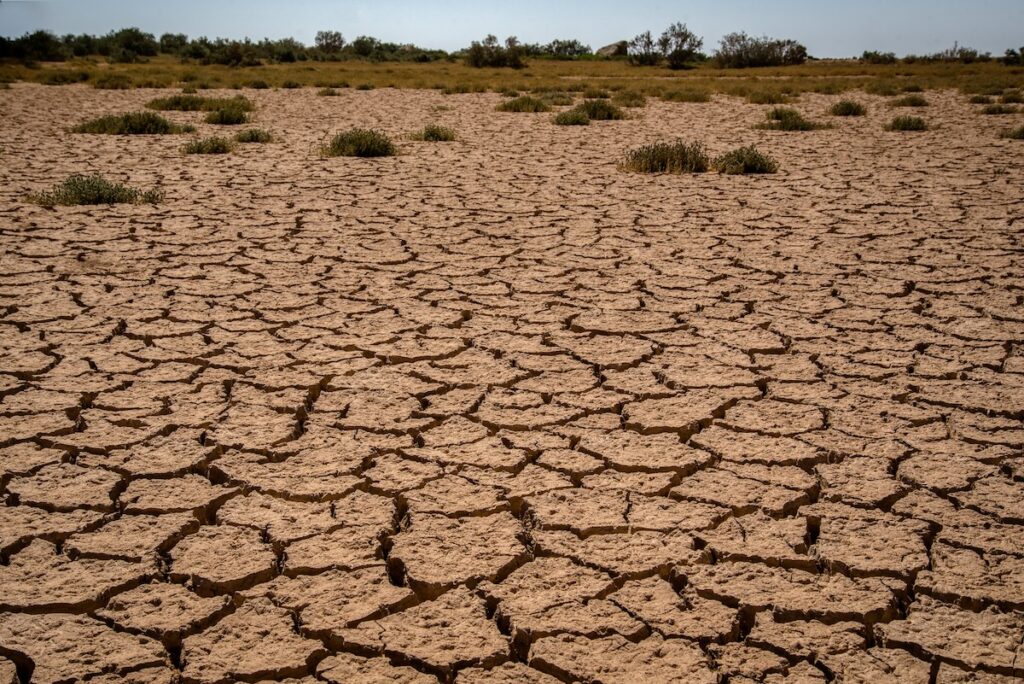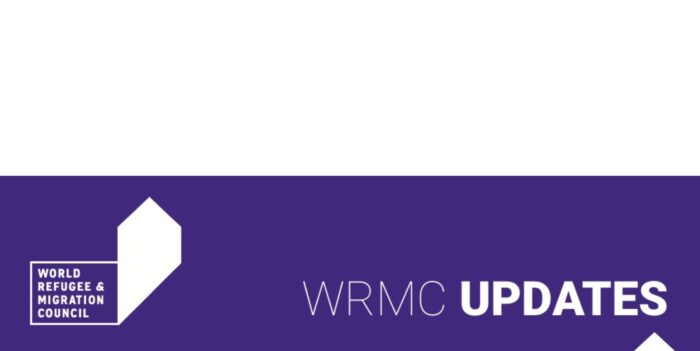December 2023

Photo: UNRWA
Children, displaced left vulnerable from armed conflict and government backsliding
Armed conflicts around the world combined with concerted efforts by some governments to close borders or push back asylum seekers have left displaced persons, and especially children, extremely vulnerable. Violations of human rights are growing in number and scope.
The WRMC has raised warnings and offered responses. On Ukraine, Lloyd Axworthy and Allan Rock outlined ways to seek justice for child victims of conflict and joined other human rights experts at the United for Justice: War Crimes against Ukrainian Children conference, with a focus on accountability. On the Israel-Gaza conflict, our statement and analysis of threats to children focused on the need for humanitarian protection. We have also responded to the recent pushbacks and refoulement of displaced persons by Pakistan and Iran.
Our Renewed Call to Action — as well as proposals to counter forced displacement, gender-based violence, corruption and other human rights violations and recent hearings led by Council member Canadian Senator Ratna Omidvar — detail key components of WRMC’s advocacy for the forcibly displaced.

Drought-ridden Azraq Basin (Qa ‘Al-Azraq), Jordan. (Photo: Seersa Abaza / IWMI)
Climate change and displacement
As world leaders for COP 28 meet in Dubai, Council members and refugee-led organization partners have raised their voices with crucial calls to action.
UNHCR showcased Global Independent Refugee Women Leaders (GIRWL) co-founder and CED of Asia Pacific Network of Refugees Najeeba Wazefadost’s advocacy on the impacts of the climate crisis: “It is not just an environmental issue; it is a human crisis, and it is increasingly becoming a refugee crisis.”
Honorary Council Chair Prince El Hassan Bin Talal of Jordan with Tabinda Sarosh called for the water crisis in the Middle East and North Africa to be at the top of the agenda at COP28.
Council member Warda Shazadi Meighen and others from the Canadian Association of Refugee Lawyers published their Report on Climate Migrants, saying that governments need to act and outlined specific ways for Canada to proactively create law and policy to meet international human rights obligations and protect migrants fleeing climate change.
Shaza Alrihawi co-founder of GIRWL and the Global Refugee-led Network, was set to join Powering Gender Equity for Refugees: Inspiring Stories and Solutions at COP28’s ClimateAction Innovation Zone.
GIRWL co-founder and New Women Connectors’ Anila Noor with other women leaders called for grassroots solutions to energy poverty: “Today’s humanitarian system has failed to lift refugees out of energy poverty.” New Women Connectors also co-hosted Feminist Leadership in Climate Action in the Context of Migration and Displacement.

Global Refugee Forum
The WRMC committed to support two pledges as part of the multi-stakeholder pledge process at the Global Refugee Forum: The Refugee Participation Pledge, spearheaded by the Globe Refugee-Led Network, which includes GIRWL co-founders, to support a “participation revolution.” The Legal Community Pledge led by PILNet to support legal advocacy, policy engagement and asylum capacity development. This year’s Global Refugee Forum will include participation by refugee leaders, including GIRWL Co-founders Najeeba Wazefadost and Shaza Alrihawi. Between them, they will join high-level events, including on gender equality and gender-based violence, meaningful refugee participation, and resettlement. Council member and Ikea Foundation CEO Per Heggenes will be participating in several high-level discussions, including on private sector solutions for forced displacement. Refugee leaders will participate daily in events as part of Forum-linked events including in the R-Space.

Repurposing assets for the forcibly displaced
December 9 is International Anti-Corruption Day, created under the United Nations Convention Against Corruption 20 years ago. As part of these efforts, the Council advocates for tools to hold kleptocrats and corrupt leaders to account for causing forced displacement and purloining funds destined for humanitarian aid and development. The WRMC held a key meeting in Ottawa together with the Embassy of Ukraine and the Parliamentary Centre on repurposing frozen Russian assets to support the reconstruction of Ukraine. Watch the Forfeiting Russia’s Billions to Rebuild Ukraine event here.
This fall, Council and Task Force members Sabine Nölke, Robert Currie, Fen Osler Hampson and Allan Rock met with Swiss government officials, representatives of the World Economic Forum and the Basel Institute on Governance to discuss ways to expedite confiscation and potential forfeiture of assets purloined by unscrupulous individuals and government officials. Also, new legislation tabled by Council member and Canadian Senator Ratna Omidvar in October would allow Canada to confiscate state assets by executive action.
Ongoing work includes a proposal for a civil chamber to complement other international efforts to pursue alleged wrongdoers. Recent publications include a new proposal by Council member Alison Lawton and Lauren Casey for a Canadian Ukrainian Social Impact Reconstruction Fund, Leading by Example and Toward a More Effective Implementation of Anti-Corruption Measures.

Migration and displacement in the Americas
El North and Central American Task Force on Migration held a series of events in Washington, DC, to complete a round of consultations about the research-driven recommendations on improving regional cooperation and responsibility sharing issued by Task Force members from across the region. A policy dialogue hosted by the Canadian Embassy in Washington, DC, with the support of Global Affairs Canada, brought together diplomats, government officials and representatives of regional and international organizations.

WRMC welcomes five new Council members:
- Jayne Fleming, director of international refugee protection programs at Reed Smith LLP including the Lamp Lifeboat Ladder project.
- James Hathaway, Degan Emeritus Professor of Law at the University of Michigan Law School
- Victor Lal, founder and executive director of Haven (findhaven.org)
- Alison Lawton, founder and CEO of Mindset Social Innovation Foundation and member of the Council’s anti-corruption task force.
- Warda Shazadi Meighen, partner at Landings LLP, where she practices immigration and refugee law.
